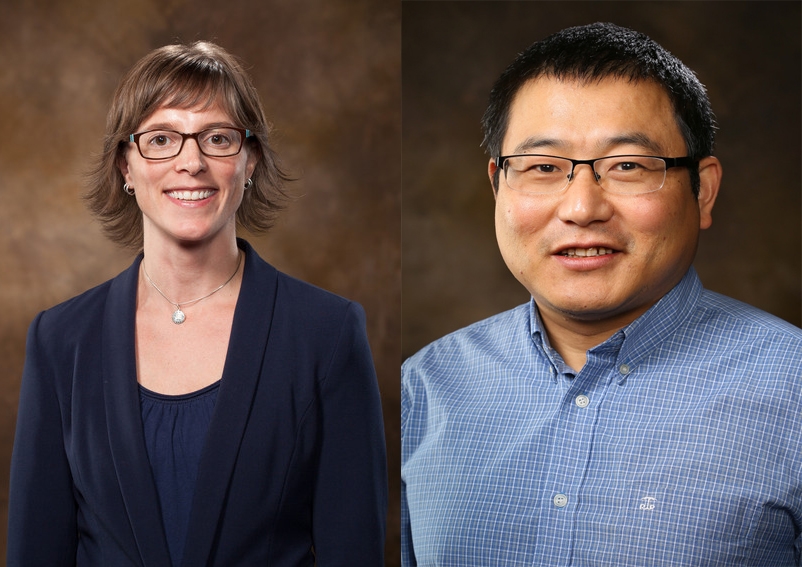Social and Demographic Factors Linked to Charitable Giving in Recent Study
FAYETTEVILLE, Ark. – Demographics and social connections – how trusting people are and whether they have close relationships with others – significantly influence charitable giving, according to a study by University of Arkansas researchers. The findings could help guide philanthropies as they seek donations from individuals.
The study, written by assistant professor Patricia Snell Herzog and professor Song Yang, both from the Department of Sociology and Criminal Justice, was published in the journal Nonprofit and Voluntary Sector Quarterly. Analyzing previously collected survey data, Herzong and Yang found that certain demographics were linked to higher levels of charitable giving. Women, people with higher household incomes and those who attend religious services regularly were more likely to give. The study also found that Democrats were more likely to give than people with other political affiliations, as were older people and those with a college degree.
The two social variables Herzog and Yang studied were “trust” and “contacts.” Social trust is a measure of how respondents answered the statement, “Generally speaking, most people can be trusted,” on a scale ranging from “strongly agree” to “strongly disagree.” Social contacts is a measure of how many adults respondents had a close relationship within the last year.
On those measures, researchers found that respondents with higher levels of social trust were more likely to give, but trust alone was not the full explanation. Social contacts were more strongly linked to giving; however, the researchers found it was the fact that respondents had any close social contacts, not the number of those contacts, that better predicted being a giver. Most importantly, the most consistent explanation across all models was that respondents whose social contacts gave to charity had a higher chance of giving themselves.
In 2015, individuals gave $229 billion to charities, the paper noted, a figure that far exceeds levels of 30 years ago. Understanding why people give helps philanthropic organizations become more effective at fundraising, the paper noted. Herzog and Yang said, “These findings indicate that targeting individuals may not be as effective as strategies that seek to increase giving through network ties.”
About the J. William Fulbright College of Arts and Sciences: Fulbright College is the largest and most academically diverse unit on campus with 19 departments and more than 30 academic programs and research centers. The college provides the core curriculum for all University of Arkansas students and is named for J. William Fulbright, former university president and longtime U.S. senator.
About the University of Arkansas: The University of Arkansas provides an internationally competitive education for undergraduate and graduate students in more than 200 academic programs. The university contributes new knowledge, economic development, basic and applied research, and creative activity while also providing service to academic and professional disciplines. The Carnegie Foundation classifies the University of Arkansas among only 2 percent of universities in America that have the highest level of research activity. U.S. News & World Report ranks the University of Arkansas among its top American public research universities. Founded in 1871, the University of Arkansas comprises 10 colleges and schools and maintains a low student-to-faculty ratio that promotes personal attention and close mentoring.
Topics
Contacts
Patricia Snell Herzog, Assistant Professor, Sociology and Criminal Justice
J. William Fulbright College of Arts and Sciences
479-575-3779,
herzog@uark.edu
Bob Whitby, feature writer
University Relations
479-575-4737,
whitby@uark.edu
Headlines
U of A Bands to Hold Three Nights of Concerts
The Symphonic Band, the Wind Symphony, the 4 O'Clock and 5 O'Clock Bands and the Wind Ensemble will perform April 21-23 at the Faulkner Performing Arts Center on the U of A campus.
Honors College to Host 'Best in Show' Dog Celebration
The campus and community are invited to celebrate our furry friends with popsicles, water and dog treats from 3-4 p.m. Thursday, April 25, in the Gearhart Courtyard.
New Parasite Affecting Canadian Partridges Named for Arkansas Poultry Scientist
A long-time colleague in Canada gave a newly found parasite the scientific name Eimeria hargisi in honor of U of A poultry science researcher Billy Hargis.
U of A School of Law Student Selected for Ms. J.D. Leadership Academy Intensive
Tristan Branstetter-Thomas, a second-year law student, was one of 30 students from across the country chosen to participate in the leadership academy at the Northwestern Pritzker School of Law in Chicago.
Needy Honored as Distinguished Alumna of University of Pittsburgh Engineering College
College of Engineering Dean Kim Needy was among seven alumni of the University of Pittsburgh Swanson School of Engineering honored in April as part of the 2024 Class of Distinguished Alumni.





